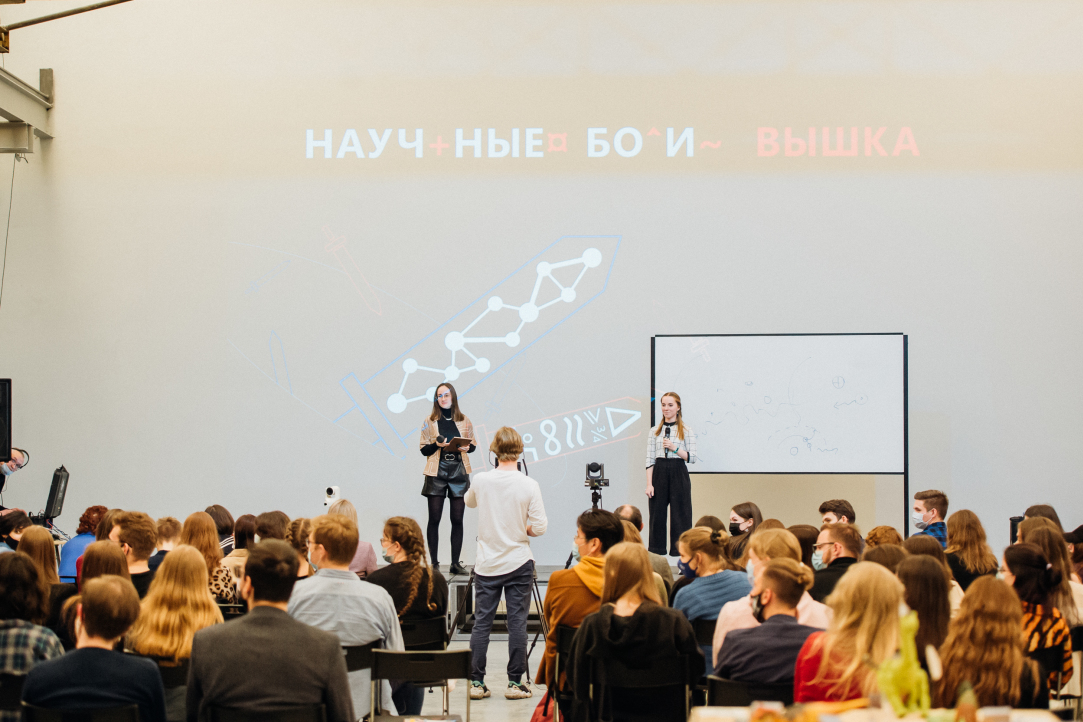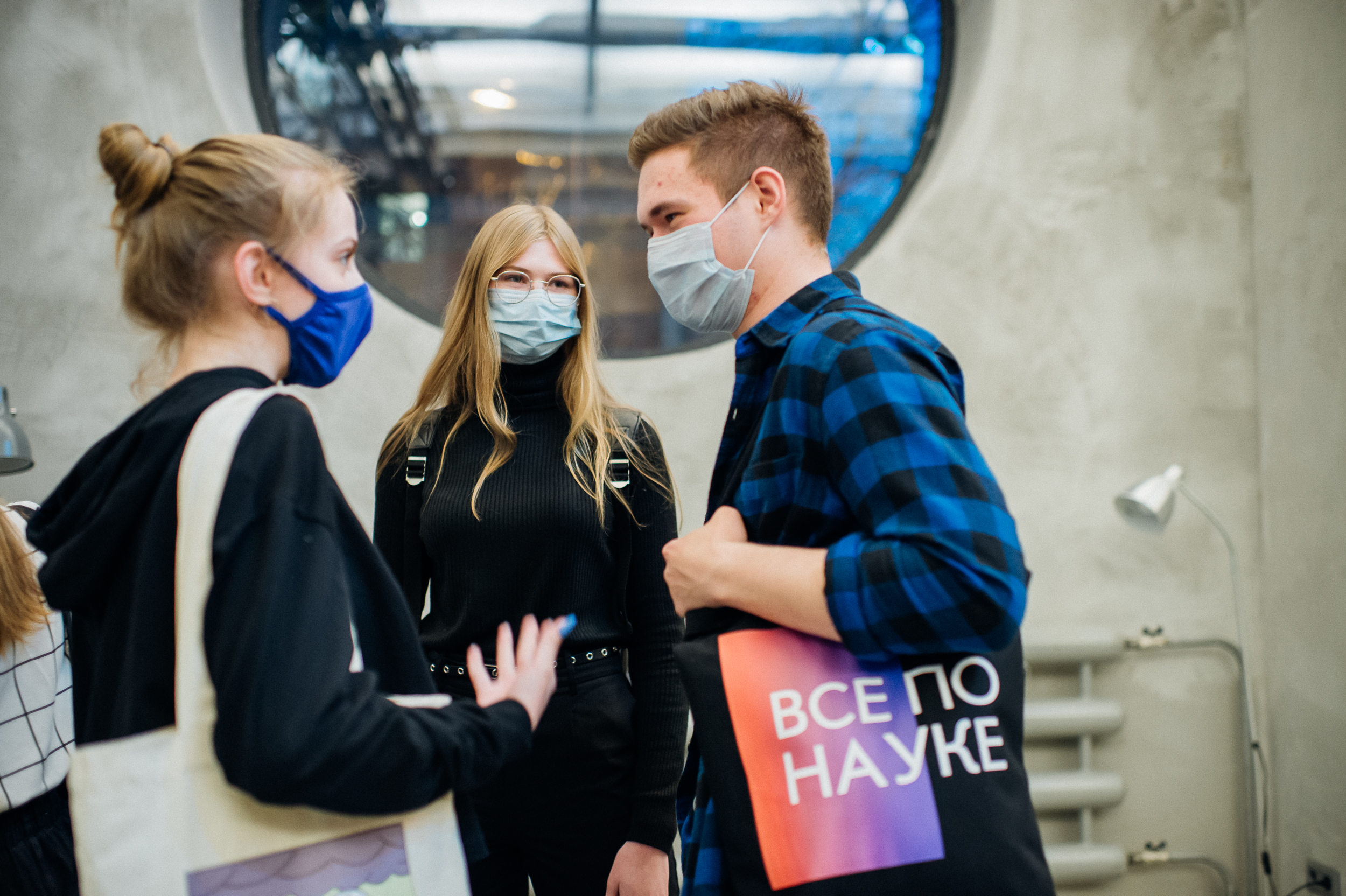Robot Rights and Talking Babies: Discussions at HSE Science Battles

Four young scientists competed in the second semi-final of the fifth season of HSE University Science Battles, which was held at HSE Cultural Centre. What tasks lead students to cheat on exams, how babies learn to talk, whether artificial intelligence is subject to copyright, how to deal with false modesty — each researcher presented their work while the audience and the jury chose a winner to compete for the main prize of the season — an academic travel grant.
The rules of Science Battles are simple. Each battle has four participants who have 10 minutes to present their research. There are no tech presentations — participants can use only their charisma and personal charm. The winner of the semi-final of the fifth season gets to represent the university at the first interregional Science Slam, which will be held in Moscow in early June.
The following participants took part in the semi-final: Sofia Bikmulina (bachelor’s programme in Law), Daria Mitsuk (bachelor’s programme in Fundamental and Computational Linguistics), Egor Sagitov (master’s programme Measurements in Psychology and Education), Anna Fisenko (master’s programme Positive Psychology).
The winner was determined by audience vote and the opinion of the expert jury, including graduate student and lecturer of the Faculty of Law Dzhamali Kuliev, research fellow of the Faculty of Social Sciences Ekaterina Kashirskaya, senior lecturer of the Faculty of Social Sciences Anna Ivanova and research assistant of the International Linguistic Convergence Laboratory Alina Russkih.
Linguistics from the Cradle
Daria Mitsuk was the first to present her study on the topic ‘They understand everything but say nothing: How babies learn to speak.’ She sought to learn and, most importantly to explain, how children up to two years old manage to memorize words from the incomprehensible ‘family buzzing’ and find language patterns.
She discovered that children first learn the words and syllables that they hear most often and determine the so-called statistical language rules. For example, they learn to call mom ‘mom’ after other family members.
After mastering statistical patterns, kids begin to catch the accents. The young researchers therefore concluded that in words of two syllables, the first one is usually stressed. Daria Mitsuk was able to confirm this empirically. During the experiment, infants up to a year old listened to a sequence of syllables and reacted only to those where the stress fell on the desired syllable.
How to Teach Students to Cheat? It’s Easy!
‘How to make all students start cheating’ was the research topic presented by Egor Sagitov, the second participant in the semi-final. In the best traditions of Grigory Oster's ‘Bad Advice’, the young researcher spoke about how the learning process should not be organized if the goal is to make the academic environment more honest.

A student survey conducted at several Russian universities showed that the status of the university, the chosen major and the student age have very little effect on potential cheating. The class format, on the other hand, is a much more significant variable. Egor Sagitov argues that the main reason students cheat can be explained by the following pattern: the more often a teacher suggests that students rewrite and retell educational materials in the classroom, the more often they implement a similar strategy in exams. They replicate what they have learned.
Discussions and work to solve cases should become the top tools used by everyone taking part in the educational process, says the researcher.
Don't Offend Robots
If you though law was a boring topic only connected with lawsuits and legal texts, then you’ll change your mind after Sofia Bikmulina's speech on ‘Protecting Artificial Intelligence: the law watching out for creativity.’ The student explained how authorship of works created by artificial intelligence is protected from a legal point of view.
Copyright regulation in this area is not easy, at least because neural networks reproduce elements of a work of art from a human-defined code. The authorship of a work should therefore be assigned to the robot owner.
On the other hand, artificial intelligence and robots may become full-fledged members of our society in the near future, which means that their rights will have to be protected. Sofia Bikmulina suggested using copyrights related to the work as a tool to protect the rights of honest robots, as they give the robot creator the right to the created works of art, and the right to their execution and use to the AI.
No False Modesty
Anna Fisenko finished the competition with her presentation entitled ‘The phenomenon of false modesty’. Her research answers a question that everyone has asked but few have tried to answer seriously: why do we sometimes underestimate our strengths if we are confident in their significance and importance?
Anna Fisenko believes that modesty is a quality of people who sensibly assess their achievements and calmly accept compliments. At the same time, so-called false modesty is associated with the phenomenon of downplaying the merits that a person appreciates deep down.
Such manipulation is primarily aimed at getting even more confirmations of self-importance from the audience. This technique is most often used by people with an external locus of control, i.e., the habit of seeing the cause of success and failure in factors that don’t depend on themselves individually. However, as the researcher reassured the audience, false modesty also performs a positive function: it is an adaptive mechanism for establishing close contact with other people.
The audience voted that Daria Mitsuk had won the battle, with Anna Fisenko taking second place. The winners thanked the audience for their support and promised to continue working on their projects.
Science Battles is a student popular science project that has been taking place at HSE University since 2016. Promising scholars present their research in various fields to the audience, using only oratory and props. Each Science Battles event include presentations by four participants. The audience and the jury choose the best presentation, and the winner gets the opportunity to advance to the season finale and compete for the main prize — an academic travel grant.
See also:
Pokémon, ARPANET, and the Mysterious East: Science Battles between Student Organisations at HSE
A special session of HSE Science Battles has taken place at the HSE Cultural Centre. This time, the speakers represented their student organisations and scientific fields. The evening brought together ideas about the future—from metaverses and deciphering ancient languages to neuromodular chips and the prospects of social sciences.
Science of Winning: Republic of Scientists Festival Held at HSE University
On November 8, HSE University hosted the Republic of Scientists Festival for the seventh time. The event aims to remind students that science is multifaceted and universal, to showcase areas of knowledge beyond their educational curriculum, and to connect early-career scientists with one another. Guests of the festival enjoyed interactive activities, popular science lectures by university faculty and alumni, and the grand finale of Season VII of Science Battles.
From Ingenious Fungi to Post-feminism: HSE University Hosts Season’s Last Science Battles Semi-Final
Season VI of Science Battles at HSE University is entering the homestretch. The June semi-final determined the list of finalists and helped many viewers choose their favourites. This time, young researchers decided to figure out how to conduct a police lineup without destroying a person’s life, as well as how to improve a child’s academic performance without instilling neurotic perfectionism. They also found out that fungi and mould help heal scars and save the environment, and that adherents of post-feminism have very mixed feelings about their own images on TikTok.
From Cultural Appropriation to Prison Jargon: Second Semi-Final of Science Battles Takes Place at HSE University
On March 19, the second semi-final of the fourth season of HSE University Science Battles brought together the topics of cultural appropriation, pharmacological neural networks, prison jargon, and ‘diseases’ of higher education on the same stage. Students from various degree programmes presented their projects in the Community space. Read on to find out more about the performances featured in the semi-finals.
From Hate-Watching to GMOs: Highlights of the HSE Science Battles’ Third Semi-Finals
The fifth season of HSE Science Battles is currently underway, with the Sber office serving as a venue for another stage of the battle. Four speakers fought for a place in the finals by presenting their research in a ‘TED Talks’ format. The HSE News Service reports on highlights from the event, including how to explain to your grandmother that GMOs aren’t dangerous, what font you should use to develop your memory, and who ‘hate-watchers’ are.
‘It Was Interesting to Showcase a Unique Student Project’
Held as part of the Second New Knowledge Marathon, the fourth HSE Science Battles attracted a wide audience. HSE Students Frol Sapronov, Marina Kasyulina, and Vsevolod Nikolsky took part in the competition’s new televised format to demonstrate how to talk about science vividly and in simple terms understandable to any audience.
HSE Science Battles Wrap Up Third Season
What professions in Russia are considered ‘dirty’? Do computers have empathy? What happens when the brain incorrectly predicts how we feel? The answers to these and other questions were tackled at the final round of the HSE Science Battles, which was held online for the first time this year. Read on to find out which performance was rated highest by the audience and jury and why the Science Battles are a must-see for everyone.


